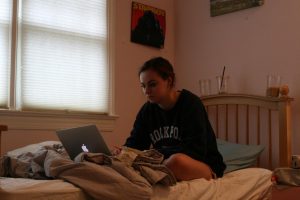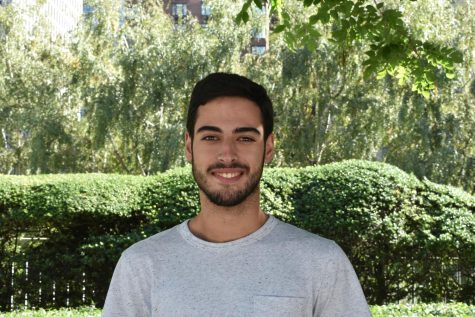Coronavirus and Counting Sheep: How the Pandemic Is Affecting Your Sleep
Disruptions to daily routines due to the pandemic and quarantining this year have thrown off many students’ sleep schedules.
November 11, 2020
Over the course of nine months, the pandemic has caused college students across the nation to toss and turn in their sleep. Students forced into quarantine have had to adopt new schedules and minimize their outdoor activities. Since human bodies and brains depend on consistency, experts say that any disruption to one’s routine can lead to poor sleeping patterns.
The human body has a biological clock that regulates one’s circadian rhythm, an internal process that rotates the 24-hour sleep-wake cycle of individuals. If a student is staying up more during the night and sleeping more in the daytime, their melatonin levels can fluctuate. Melatonin is the sleep-inducing hormone that can only be produced under dark-light conditions which occur between 10 p.m. and 4 a.m. If a person does not sleep during this period, their body could inhibit the production of melatonin because individuals are likely to be exposed to light at other times.
Students are also increasing their screen time as a result of the pandemic. More exposure to the blue light from phones, tablets and laptops can also lead to the suppression of melatonin secretion. Anoosh Kouyoumdjian, Fordham College at Lincoln Center (FCLC) ’21, believes that her blue light consumption is due to an increased virtual workload, which further impairs her sleep schedule. She stated that it made her sleep cycle “more erratic.”
“Especially on days I don’t have class or meetings, it takes a lot of discipline to make sure I get up and get my day going,” Kouyoumdjian said. “I think my sleep cycle got in the way of my school performance in the beginning, but now I try to stay on track and allow myself to get at least seven hours of sleep.”
A study from the journal of Neuropsychiatric Disease and Treatment found that sleep problems and disorders can negatively impact college students’ academic performances. The study stated that 31% of students were prone to morning fatigue. These researchers also found that 60% of college students had poor sleeping habits, while 7.7% of these students met the criteria for insomnia. Additionally, people who did not have effective sleeping patterns had reduced daytime functioning and often had lower GPAs.
I have naturally gotten less energy throughout the day overtime and thus am a little more sluggish and more prone to doing all of my work late at night. Jasmine Petrov, FCLC ’22
“The quality of my sleep does affect my productivity,” Loli Alvarez, FCLC ’21, said. “Between classes, senior thesis, grad school applications and work I am always busy, so there never seems to be enough time in the day to get everything done. Despite hitting the deadlines for class work I still feel behind.”
Current Biology reported in a study that even though some people may be sleeping more as a result of quarantine, the quality of their sleep has declined. Jasmine Petrov, FCLC ’22, stated that even though she is getting more sleep on average because she no longer has to commute, she has decreased energy levels. “I have naturally gotten less energy throughout the day overtime and thus am a little more sluggish and more prone to doing all of my work late at night,” Petrov said.
Students with poor sleeping schedules can develop mental health problems or become more prone to poor immunity. Sleep deprivation can coincide with depression, anxiety, chronic fatigue and a lower quality of life as a result. Irregular sleep cycles can lead to increased cardiovascular morbidity as well as higher risks of diabetes and obesity.
Establishing a daily routine will not only improve the health of college students, but may also positively impact their academic performance.
With a looming second wave, individuals must strengthen their immunity since underlying medical conditions can make one more susceptible to severe cases of COVID-19. Sleeping well is essential to building your immunity. Although regular sleeping patterns have become yet another casualty of the COVID-19 crisis, there are some ways to improve the quality of your slumber.
During the pandemic, there has been an increasing trend in alcohol consumption. An article published by UC Davis Health suggests that having an extra glass of wine can augment sleep issues. Instead, they recommend decreasing one’s dependence on alcohol and caffeine.
Furthermore, UC Davis Health encouraged creating a normal daily routine and avoiding naps throughout the day. Students can also regulate their sleep cycle by reducing their screen time at night and exercising regularly.
The pandemic has disrupted the sleep-wake cycles of many college students. However, to maintain a healthy lifestyle, it is crucial for young adults to get a restful seven to eight hours of sleep. Establishing a daily routine will not only improve the health of college students, but may also positively impact their academic performance.

















